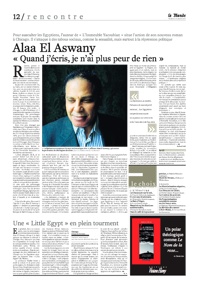Automatically posted links for November 29th:
- Toward a New U.S.-Middle East Strategy – Saban Center (eeekh!) and CFR team up for Mideast policy recommendations for next prez
- Foes Use Obama’s Muslim Ties to Fuel Rumors About Him – washingtonpost.com – “Obama aides sharply disputed the initial stories suggesting that he was a Muslim, and in Iowa, the campaign keeps a letter at its offices, signed by five members of the local clergy, vouching for the candidate’s Christian faith.” I like these conspiracy
- 1973 U.S. Cable on Mideast Mirrors Current Events – washingtonpost.com – “In January 1974, with the Watergate scandal making headlines, Egypt’s President Anwar Sadat wrote in a secret letter to Faisal that President Richard M. Nixon “could easily be impeached” and that “Arabs must do everything they can to strengthen” Nixon, a
- Seven Years for Murder – More Egyptian police officers sentenced for torture
- Trappist Command: Thou Shalt Not Buy Too Much of Our Beer – WSJ.com – I have had this beer, and it really is something else. It tingles against your palate and feels incredibly velvety and smooth. The bizarre sensation lingers a long time, numbing your mouth, and its bouquet is very subtle for such a strong beer, with very
- L?affaire du faux mariage homosexuel s?avère être une manipulation politique – This article (from a very pro-regime newspaper) accuses the Islamist movement in Morocco that is close to the PJD of nearly lynching a man involved in a rather sordid affair of “homosexual marriage” in northern Morocco. If you check at-Tajdid, the PJD-fri
- ??? ????? – The site of Muslim Brotherhood activist and blogger Ahmed Mohsen, who was arrested in Fayoum along with 25 people who were apparently planning their strategy to contest next year’s municipal elections
- New term for Egypt CB governor – al-Okdah’s reappointment should squash persistent rumors that he is in the running for becoming PM. Nazif probably to stay for another year at least
- Saudis See Potential for Influence in Sharif – WSJ.com – An interesting look at Saudi policy towards Pak, based on the fall of Musharraf
- Al Jadid Magazine – New issue of US-based Arab culture mag out, including a look at the World Press Photo pic from Lebanon, an interview with Alaa al-Aswany, and a lot more


